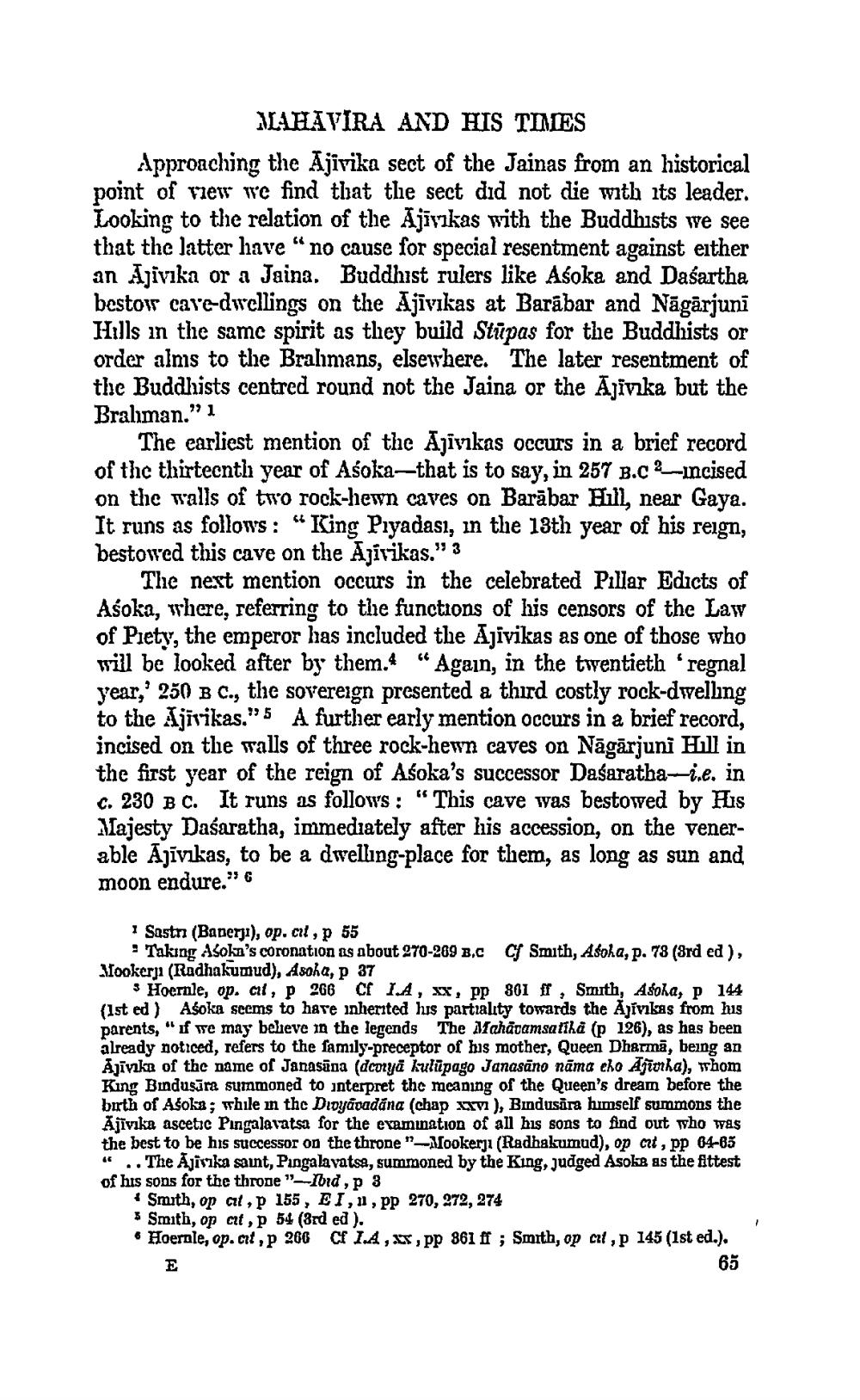________________ MAHAVIRA AND HIS TIMES Approaching the Ajivika sect of the Jainas from an historical point of view we find that the sect did not die with its leader. Looking to the relation of the Ajiyikas with the Buddhists we see that the latter have "no cause for special resentment against either an Ajivika or a Jaina. Buddhist rulers like Asoka and Dasartha bestow cave-dwellings on the Ajivikas at Barabar and Nagarjuni Hills in the same spirit as they build Stipas for the Buddhists or order alms to the Bralimans, elsewhere. The later resentment of the Buddhists centred round not the Jaina or the Ajivka but the Braliman." 1 The earliest mention of the Ajivikas occurs in a brief record of the thirtecnth year of Asoka-that is to say, in 257 B.C2_Incised on the walls of the rock-hewn caves on Barabar Hill, near Gaya. It runs as follows: "King Piyadasi, in the 13th year of his reign, bestowed this cave on the Ajivikas." 3 The next mention occurs in the celebrated Pillar Edicts of Asoka, where, referring to the functions of his censors of the Law of Piety, the emperor has included the Ajivikas as one of those who will be looked after by them. "Again, in the twentieth 'regnal year,' 250 B C., the sovereign presented a third costly rock-dwelling to the Ajirikas." 5 A further early mention occurs in a brief record, incised on the walls of three rock-hewn caves on Nagarjuni Hill in the first year of the reign of Asoka's successor Dasaratha--i.e. in C. 230 BC. It runs as follows: "This cave was bestowed by His Majesty Dasaratha, immediately after his accession, on the venerable Ajivikas, to be a dwelling place for them, as long as sun and moon endure." * Sastri (Banery:), op.cit, p 55 Taking Asoka's coronation as about 270-289 B.C Cf Smith, Asoha, p. 78 (8rd ed), Vookerji (Radhakunud), Asoha, p 37 3 Hoernle, op. ci, P 266 Cf 1.A, XX, pp 801 ff, Smith, Asoha, P 144 (1st ed) Asoka seems to have inherited lus partiality towards the Ajivikas from his parents, if we may believe in the legends The Maharamsaliha (p 126), as has been already noticed, refers to the family-preceptor of his mother, Queen Dharma, being an Ajivika of the name of Janasana (dcutya kulipago Janasano nama cho Ajitha), whom King Bindusira summoned to interpret the meaning of the Queen's dream before the birth of Asoka; while in the Dioyaoadana (chap XXVI), Bundusira himself summons the Ajivika ascetic Pingalavatsa for the examination of all his sons to find out who was the best to be his successor on the throne " Hookerji (Radhakumud), op cit, pp 04-05 " .. The Ajirika saut, Pingalavatsa, summoned by the King, judged Asoks as the fittest of his sons for the throne "-Ibid,p 3 Smith, op al, 155, EI, 1, pp 270, 272, 274 * Smith, op cit, p 54 (3rd ed ). * Hoernle, op.at ,p 206 C 1.4, 28, pp 861 ff ; Smith, op cit,p 145 (1st ed.). 65




